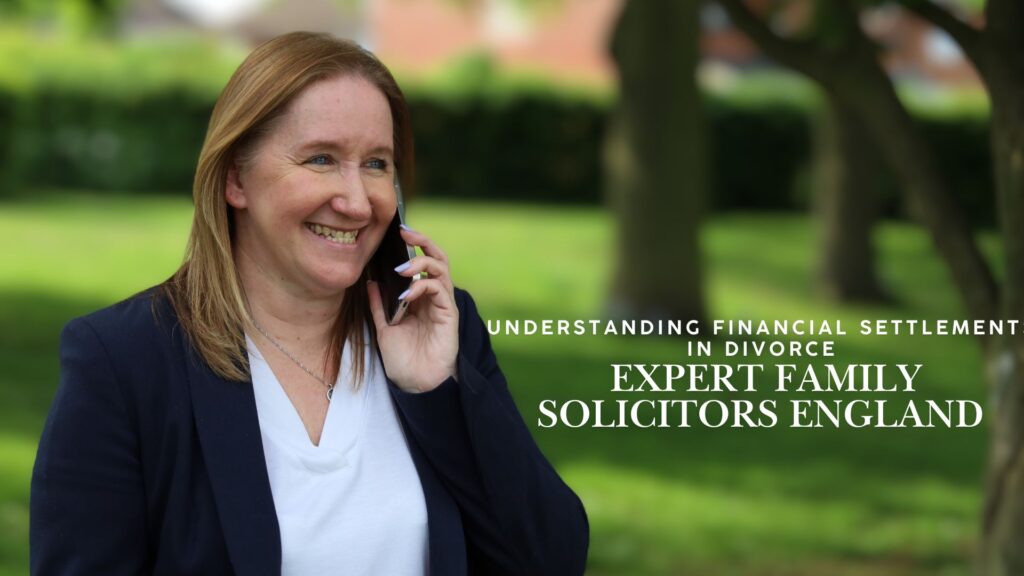Divorce is not only an emotional process, but it involves important legal and financial decisions, which can affect your future stability. One of the most critical aspects of divorce is reaching a fair financial settlement. This determines how assets and finances are divided between you and your spouse. Whether it’s property, savings, or spousal maintenance, financial settlements ensure both parties have a clear understanding of their financial obligations and rights post-divorce.
In this blog, we’ll explain what a financial settlement is and the steps involved. We will also explain how a family law solicitor can help you navigate this complex process.
What Is a Financial Settlement in Divorce?
A financial settlement is a legal agreement that determines how finances and assets will be divided after a marriage ends. It includes key issues like:
- Division of property, including the family home
- Splitting of pensions and savings
- Spousal maintenance payments
- Debts or liabilities accrued during the marriage
- Business interests, if applicable
The goal of a financial settlement is to ensure a fair division of assets. It must reflects both parties’ contributions to the marriage, as well as their future needs.
How Are Financial Settlements Reached?
There are several ways to reach a financial settlement. This depends on how amicable the divorce is and the complexity of the financial assets involved. Here’s an overview of the process:
- Full Financial Disclosure
Both parties must provide a complete and honest account of their financial situation, including income, savings, property, debts, and other assets. This step is crucial, as it allows both sides to understand the full picture and negotiate a fair division of assets. - Negotiation and Mediation
In many cases, couples can reach a financial settlement through negotiation, either directly or through their solicitors. If negotiations are challenging, mediation may be recommended. Mediation involves a neutral third party who helps both sides come to an agreement without the need for court intervention. A family law solicitor can represent your interests during these discussions, ensuring you receive a fair share. - Consent Orders
Once both parties have agreed on a financial settlement, a family law solicitor will draft a Consent Order. This formalises the agreement and makes it legally binding. A judge must approve this order to ensure it’s fair and reasonable. Once approved, both parties are legally required to adhere to the terms of the settlement. Neither party can make further financial claims against the other in the future. - Court Proceedings
If you and your spouse cannot reach an agreement through negotiation or mediation, you may need to apply to the court for a Financial Remedy Order. The court will assess your financial situation and make a decision based on factors such as the length of the marriage, the needs of each party, and the welfare of any children involved. The court’s primary aim is to achieve a fair outcome, often seeking to balance both immediate and future financial needs.
Key Factors in Determining Financial Settlements
When deciding on a financial settlement, various factors come into play, including:
- The length of the marriage: Longer marriages may result in a more equal division of assets.
- Each spouse’s financial needs: This includes living expenses, housing, and care for any children.
- Income and earning capacity: The court considers both current and future earning potential of each spouse.
- Contributions to the marriage: This includes financial contributions (like income) and non-financial contributions, such as raising children or managing the home.
- The welfare of any children: Ensuring the financial security of children is always a priority, so the court will ensure their needs are fully considered in any settlement.
The Role of Spousal Maintenance
In some cases, spousal maintenance—regular payments from one spouse to the other—may be included in the financial settlement. This is usually considered when one spouse has a significantly lower income or earning capacity. Maintenance payments can be temporary or long-term, depending on the circumstances, and are designed to help the lower-earning spouse transition to financial independence.
How a Family Law Solicitor Can Help with Financial Settlements
Navigating the financial settlement process can be complex, especially if significant assets or contentious issues are involved. Having an experienced family law solicitor is crucial to ensure your rights and interests are fully protected. Here’s how a solicitor can assist:
- Expert Legal Advice
A solicitor can provide clear, practical advice about your financial rights during a divorce. They will explain what you’re entitled to and help you understand how the law applies to your situation, giving you the confidence to negotiate from a position of strength. - Negotiation Support
Negotiating a financial settlement can be difficult, especially when emotions are running high. Your solicitor will represent you in negotiations or mediation, working to achieve a fair outcome that meets your financial needs. They’ll ensure that no critical details are overlooked and that the agreement reflects your contributions and future requirements. - Drafting Consent Orders
Once a settlement is agreed upon, a solicitor can draft a Consent Order that formalises the terms. They’ll ensure the document is comprehensive and enforceable, protecting you from any future financial claims. - Court Representation
If negotiations fail and the case proceeds to court, a family law solicitor will represent you throughout the proceedings. They’ll prepare your case, present the necessary evidence, and advocate for your financial interests in front of the judge. - Enforcement or Modification
If circumstances change after a financial settlement is in place, such as a change in income or housing needs, a solicitor can help you seek a modification to the original agreement. Additionally, if the other party fails to comply with the settlement, your solicitor can take legal action to enforce it.
Conclusion
Reaching a fair financial settlement is an essential part of the divorce process, as it provides both parties with financial security and clarity moving forward. With the help of an experienced family law solicitor, you can navigate the complexities of financial disclosure, negotiation, and legal agreements to ensure your interests are fully protected.
At Geraldine Watson Family Law Solicitors, we have extensive experience in handling financial settlements and can guide you through every step of the process. Contact us today to discuss how we can assist you in securing a fair and equitable financial settlement during your divorce.

